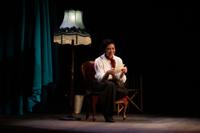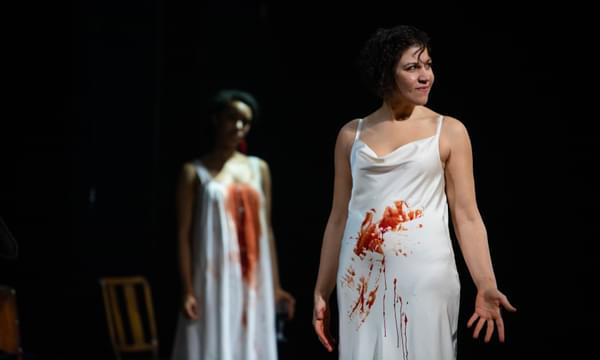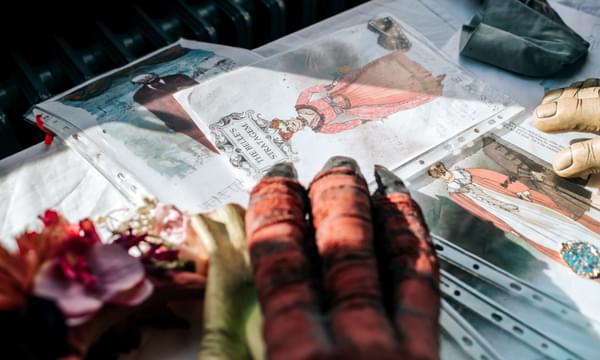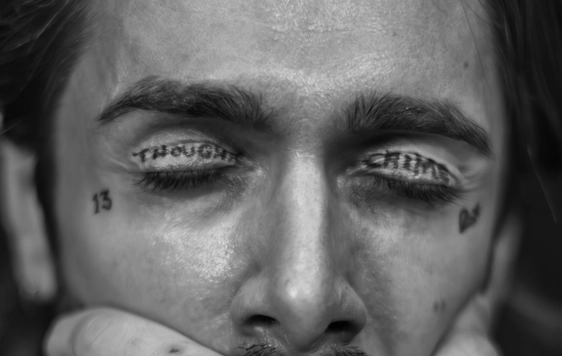News Story
We did it! We managed to get a second with Zinnie Harris, writer and director of Macbeth (an undoing); not an easy task when she only has 4 weeks to rehearse the production as well as everything else that goes alongside being the director of a show such as design meetings, costume consultations...
Anyway, we sat down with her to talk about all things writing, directing and Macbeth. Grab a cup of tea...and be prepared to want to immediately start writing your own play!
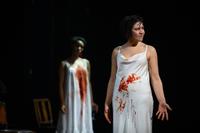
How did you get into script/playwriting and what was your first job in the industry?
I didn’t imagine I would end up a writer, I was very interested in theatre when I was at university, and I was directing a lot of plays, but I was doing a Zoology degree. When I finished that I decided I wanted to go further with theatre, but I didn’t have an English A-level, so I needed to get some education first. I applied to do a postgrad in theatre direction at Hull University, the university was great, and I put on a lot of plays while I was there, but I was also able to go to some of the undergrad lectures to fill in my education gaps.
It was there that I wrote my first play, which was pretty terrible, laughably terrible, so I put it to one side and decided I wasn’t a writer. I then moved back to Scotland and started going to workshops at the Traverse Theatre to get me on the ladder as a director. The theatre started asking me to give feedback on scripts and while reading them I kept seeing how they could be improved, how scenes could be switched around and then I started to think that, maybe, the way to get something to direct is to write a play.
I got a book out of the library called “how to write a play” and I wrote a play called M’lady, M’lad which I put in for Feb Fest which was a competition between Edinburgh University and the Traverse Theatre. The play was successful, it got a showing, and the Traverse commissioned me to write a 15 minute short for one of their programmes. That 15-minute play didn’t go forward to become a production, but the theatre gave me development time and I turned the short into a full play. That was my first professional production which was performed at Hampstead.
Then, Jack Bradley who was the literary manager at the National Theatre, came up to Scotland to run a workshop at the Festival Theatre, and you had to put a scene in to get into the workshop which I did and at the end of the week he commissioned me to write a play for the National Theatre Studio – that was my first serious commission. But it wasn’t plain sailing after that - I didn’t really have the skills to know how to repeatedly write a play so then I had quite a few years of trying to get on top of my craft.
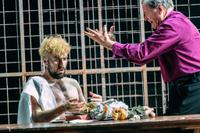
What is your favourite thing that you have written?
Well, I’m quite proud of Macbeth (an undoing). I think, maybe, This Restless House, that was such a special project, taking Aeschylus' Oresteia and delivering it through my lens. Or Meet Me at Dawn which is a really, heartfelt short play about grief. I think my other favourite is How to Hold your Breath which is about the collapse of Europe and love. It’s hard to pick a favourite actually.
What was your first ‘pinch me’ moment in your career?
My second play went to The National Theatre and that was quite a pinch me moment. I get pinch me moments everyday coming into work, I feel so incredibly lucky to be working here, at this time, and to be able to take a big classic play like Macbeth, direct it and work with the cast that I am working with, I don’t think you get much luckier than that really.
What were your early experiences of Shakespeare if/when you studied it at school?
I did Macbeth for GCSE. I think, sadly, like a lot of people's experience of Shakespeare it was pretty much on the page. It was looking at it as a piece of literature rather than a piece of drama, I don’t think I even went to a theatre to see a production. I watched various films of it but not on a stage.
I believe that Shakespeare has got to be encountered on the stage, that is what it was written for, it is not a piece of prose, it is a piece of drama, it is a piece of text to be spoken, to be moved, to be acted. Experiencing a story in 3 dimensions is completely different to encountering it on a page. When you encounter it on a page it is quite dense, heavy, wordy and the language is the thing that trips you up. As soon as you put it in 3 dimensions you realise it doesn’t matter if you don’t quite understand every word, but you will understand the intention of the character and the atmosphere of this scene. You also see everything else that helps you follow the story, which means the language becomes a bit more manageable and more understandable.
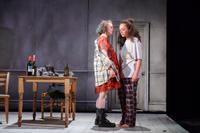
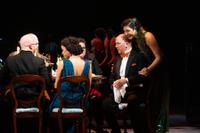
Why take on the challenge of writing and directing such a well-known and loved Shakespeare play?
That is the question that I ask myself late at night while I'm trying to get to sleep. I think it follows a series of plays and pieces of work that I've done where I am interested in taking female characters in plays, that have often been written by men and reinterpreting them with a slightly more modern sensibility, or even a more sympathetic sensibility. I think I have known for a while that I wanted to do something with Lady Macbeth, because I knew there was a missing part of her story.
Interestingly, the more I dig into the text and the more I speak to scholars, there is a school of thought that we don’t have a complete Macbeth script, and there might be scenes missing. We do have a missing chunk of her story. She is the strong one, she is the one saying “come on we can do this”, and when Macbeth is starting to lose it in the scene where he sees Banquo’s ghost, she is pulling him to the side and saying, “get a grip”. Then we don’t see her for a few scenes and when we do see her again, she is sleepwalking, and her psyche is starting to fragment. So, I have always been curious about what happens in those scenes and why she disappears and only reappears as a broken woman.
I think there are huge challenges when working with a classic like Macbeth, and Shakespeare as a whole. People may hate my version entirely, but I think the good thing about working on something like Macbeth is that the original will survive me. You can’t damage something which is such a pinnacle of our western literature. I think you can just add a different viewpoint and show that we love Macbeth but challenge the audience to look at it a different way.
I think Macbeth in the original, and in my adaptation, is ultimately a tale of a marriage, a couple who get involved in something which ultimately destroys them. I think in a lot of my work I have been writing about the relationship between men and women in a domestic framework, so it fits what I have been trying to do quite well but it’s definitely not been easy.
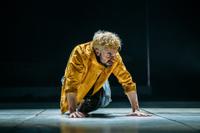
Is it difficult to be both the writer and the director of a piece?
Not for me, I like it. What it means is that you have got to make sure that your text work is done before rehearsals. Because rehearsal time is so short, I don’t have space to be sat with a pen, editing and solving text problems while rehearsing, this is why I had a few workshops and rehearsal days before everything started to make sure that I have a good rehearsal script ready for the start of January when it all begins.
What would you say to any budding writer out there, old or young, that’s thinking of playwriting as a career?
To watch a lot and to read a lot. I see a lot of writers who come to me or come to a class and say they are interested in playwriting, and I try to engage them in what they have seen, and it feels like it isn’t connected to the theatre industry. You can learn so much from each other, other writers, other directors, just from sitting in the theatre while a play is going on. I know that a lot of my ideas come from just sitting in a theatre. Just get stuck in with your local theatre, whatever is going on around you. You can also learn a lot from reading plays and reading how others do it – fill your head with plays.
Any tips for someone who wants to specifically write an adaptation?
Lots. I could talk about adaptation at some length. So, I think there are two versions of adaptations, one version is adapting between forms, this is when you are putting a novel on the stage or screen. The other version is when something exists as a play, and you are doing your own version which is true of Macbeth (an undoing) and many of my other plays.
I think all the time while writing or developing your idea, you need to be asking yourself, “what am I bringing?”, because if you have a perfectly valid play why not just do the play as it is? You have got to feel that there is something about the way you interact with the text or a take you have on a character or part of the story that means that people might see the original in a slightly different way. When you are adapting between forms (novel to stage/screen), I think you are doing a slightly different thing. I think the worst kind of adaptation is when you decide that everything that happens in the novel has got to happen on the stage/screen. Instead, I think what you do when adapting a novel, is to contract to what the essence of the novel is and write from that position. So, you may end up writing scenes that don’t exist in the novel at all, but you are doing that in order to faithfully chime with whatever the first author was trying to achieve. It is almost like; you must be in love with the original piece of work, but you also have got to see the role for you within it.
